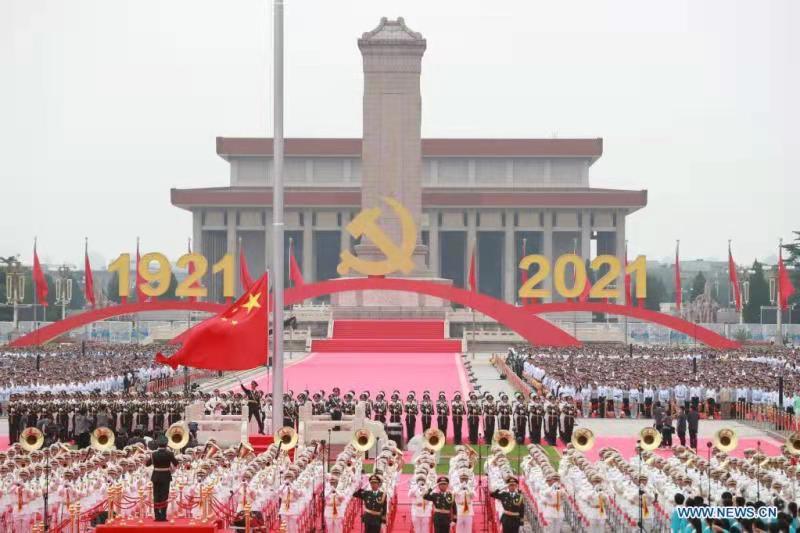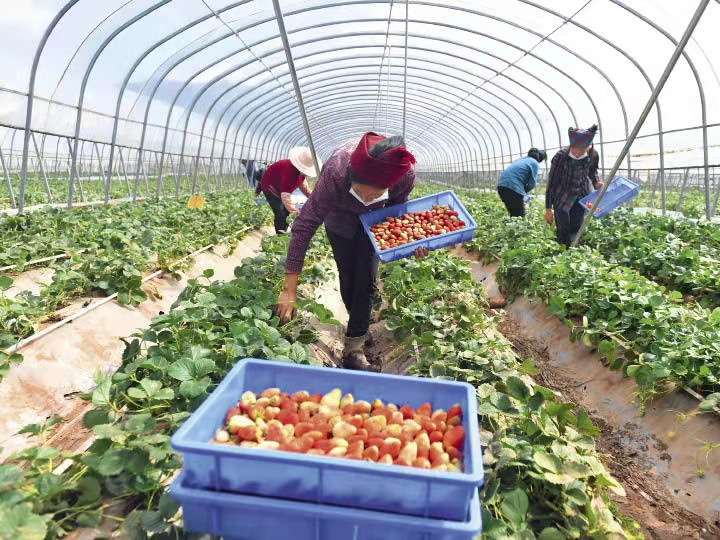
A flag-raising ceremony is held during a grand gathering celebrating the Communist Party of China (CPC) centenary at Tian'anmen Square in Beijing, capital of China, July 1, 2021.
At a grand ceremony commemorating the centenary of the founding of the Communist Party of China (CPC) at Beijing’s Tian’anmen Square on July 1, Xi Jinping, general secretary of the CPC Central Committee, solemnly declared the completion of building China into a moderately prosperous society in all respects, the country’s first centenary goal.
Almost any of China’s great achievements that Xi mentioned in his address would be considered miracles in any other country. Yet in China, they do not surprise me. With the same creativity and perseverance in which the country carried out its targeted poverty alleviation campaign and contained the COVID-19 pandemic, China now leads the world in fighting desertification, deforestation, food and water insecurity, illiteracy – virtually all of the global challenges that face every country.
China has an effective and efficient government. Unlike so-called democracies with multiple parties and contradictory self-seeking political goals, China adopts a democracy that runs in the system of multiparty cooperation and political consultation under the leadership of the CPC. All parties now pursue the same goal – building China into a great modern socialist country in all respects, the country’s second centenary goal. Since the founding of the People’s Republic of China in 1949, poverty reduction had been the top priority of the country with the objective to greatly improve people’s lives, and pragmatic Chinese leaders had fought poverty ever since – a feat I had personally witnessed for over 30 years.Since I moved to China in 1988, I have driven almost 200,000 kilometers around China, including areas such as Ningxia Hui Autonomous Region which was once deemed utterly hopeless by the United Nations (UN). But early on, the ever-pragmatic Chinese adopted the pragmatic strategy of “roads first, then riches,” as they believe transportation infrastructure is fundamental to development, Very simple, very pragmatic – and it worked. In 1994, it took me three months to drive 40,000 kilometers around China. Then over 20 years later in 2019, following the same route it only took 32 days to complete the journey – and even those once poorest villages in Ningxia now have concrete roads that lead right to the villagers’ doorsteps. The most amazing thing, to me at least, was that not only did people in remote valleys in Tibet have access to electricity and Internet but they engaged in thriving online e-commerce!
I asked many people all across China why their lives had improved and many said, “Life is good because policies are good.” “Why are policies good?” I then asked, and a large number of them replied, “Because the government knows our needs and cares for us.”
I soon learned how the government knows their needs. Even in remote villages, I saw photos of Xi Jinping, who had visited them to understand the unique roots of their poverty and then suggest solutions – even as he had done as a young leader in Fujian 30 years ago. I marveled that he set his foot in Pingtan Island 20 times when he worked in Fujian to help fight poverty. Thanks to his dedication, when I visit there now, I can take the bridge instead of a boat.

Workers pick up strawberries at Jiuru Ecological Strawberry Plantation, which is now the major income source for many once impoverished families in Zhaojue County on August 21, 2020.
No other nation in history has ever tackled poverty so single-mindedly and for so long – this is precisely why it as the world’s most populous nation has accomplished what would be a miracle in any other nations, but in China it was simply inevitable because of that old principle, “You reap what you sow.”
Sadly, some underdeveloped nations have not only not abolished poverty but in many cases are now worse off than 30 years ago. Even in a world of unprecedented wealth and technology undreamed of 20 years ago, around nine percent of the world’s people live in extreme poverty. Each day, 25,000 people die from hunger related causes. This is not just tragic but criminal in nature – but China offers hope.
With Xi Jinping’s proposal of the Belt and Road Initiative (BRI), China is simply applying its pragmatic method “roads first, then riches” into other nations – especially on the continent of Africa.
Africa is so large and rich in resources, yet it is also by far the poorest because of the legacy of colonialism that continues to this day – the very forces that almost destroyed China a century ago. But my African friends are grateful that, after centuries of struggles, China’s BRI offers hope.
U.S. President Joe Biden told Africa, “The U.S. can do better for you!” That should be true because the U.S. is richer – but so far it has only been mere talk, and no action. China, however, is letting its actions do the talking.
My youngest son, who lives with his wife and children in Africa and doing volunteer medical and social work, says that in the remotest areas of Africa, he sees Chinese working alongside Africans to help build highways, railways, dams, bridges, ports, and airports. In other words, “roads first, then riches.”
At the CPC centenary ceremony, Xi Jinping said that China has stood up, grown rich, and is becoming strong. And to no one’s surprise, the West now warns that a strong China is a threat to the so-called world order. Western fear mongering is nothing new. Even in 1899, when the West was destroying China, their media portrayed China as the world’s “Yellow Peril.” However, as President Xi Jinping said, China has never exploited others and never will.
History proves that a strong China is not a threat to peace but rather a force for it – and perhaps the only hope for the underdeveloped world that is still struggling in extreme poverty. So, I congratulate China on achieving its first centenary goal of moderate prosperity, and I applaud its attempt to share its experiences with the rest of the world.
WILLIAM BROWN is a professor of organizational behavior and also director of OneMBA Academic at Xiamen University’s School of Management.